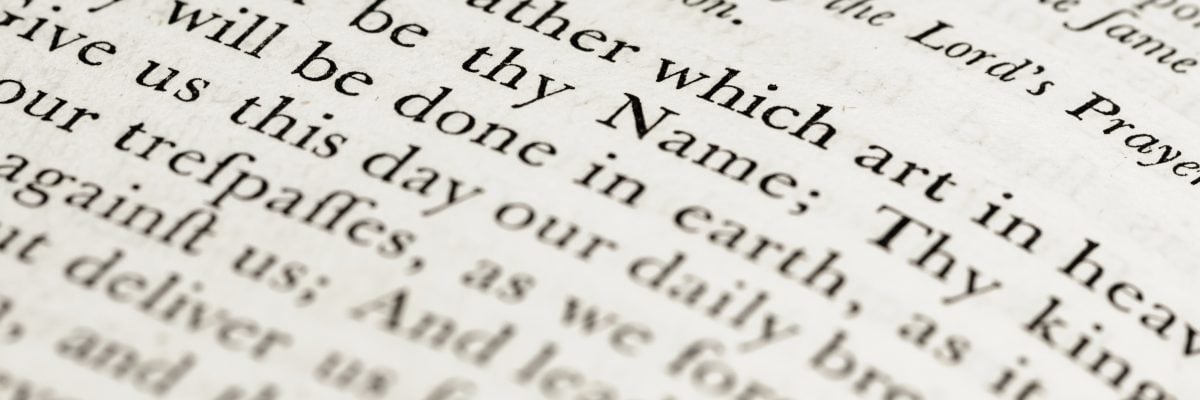
Why do Christians say the Our Father (the “Lord’s Prayer”) slightly differently?
Catholics conclude with “deliver us from evil,” whereas most Protestants, following Matthew 6:13 in the King James Version, go on to say something like, “For yours is the kingdom and the power and the glory forever.”
Are Catholics leaving out this phrase from Jesus’ prayer, or are Protestants adding to it?
Neither seems to be a good idea for Christians (e.g., Deut. 4:2, 12:21; Prov. 30:6; Rev. 22:19). To some Protestants, the Catholic omission seems like a clear example of the Church “subtracting from Scripture” (due to some “tradition of men,” perhaps). However, the history behind this little phrase is a bit more involved—and it argues for the reliability of Church tradition, not against it.
The first thing to note is that the prayer differs even among the Gospels themselves. Although the form in Matthew is the one used by nearly all Christians today, a shorter version is recorded in Luke chapter 11, where it ends with “lead us not into temptation” (v.4). So technically, one would be completely biblically justified in simply ending the prayer there.
A second interesting thing is that the verse in question is not included in the “oldest and best” biblical manuscripts, and is therefore not considered by the majority of biblical scholars today, whether Catholic or Protestant, to be part of the original biblical text. The King James Version of the Bible is based on the Textus Receptus, which itself was not based on the oldest manuscripts we have today. Neither Codex Sinaiticus nor Vaticanus contains the verse—in fact, the earliest witness we have to the longer ending of the Our Father is a late fourth- or early fifth-century parchment called Codex Washingtonensis.
The English wording of the Our Father that Protestants use today reflects the version based on the English version of the Bible produced by Tyndale in 1525. Tyndale’s version was not found in the liturgical tradition of western Christendom until the 1637 Scottish Book of Common Prayer. And although the longer ending remains popular today, there are many Bibles that do not include it. Catholic Bible translations (e.g., the Vulgate, the Douay-Rheims, or the New American) have never included it, and most Protestant Bibles do not either.[1] Even modern versions of the King James includes a footnote stating that the phrase is omitted in older manuscripts.
Furthermore, although early Church Fathers such as Jerome, Gregory the Great, Ambrose, and Augustine wrote of the importance and beauty of the “Our Father” prayer, none of them included the phrase when they referenced it. The commentaries on the prayer by Tertullian, Origen, and Cyprian do not include it either. John Chrysostom did discuss the phrase in his fourth-century homily on Matthew (19:10).
When we turn from Scripture commentary to Church Tradition, we find this phrase (which resembles 1 Chronicles 29:11) in ancient liturgical use as a short doxology (praise response) to the Lord’s Prayer. The Christian manual known as the Didache (c. A.D. 95) has a short version of the doxology after the Our Father in chapter 8, and the longer reading is found in the fourth-century Apostolic Constitutions (7.24). From there it was incorporated into the Liturgy of St. John Chrysostom as well. Thus, it seems that this phrase might very well have been a doxology—a conclusion to the original prayer that Jesus instructed his disciples to say.
Scriptural and traditional evidence points to a fourth-century addition of the phrase to the original prayer. It is likely that around this time, a scribe familiar with the liturgy added the doxology to Sacred Scripture while copying the Our Father passage, and it found its way into later translations of the Bible itself. These copies eventually outnumbered the more ancient documents, and the phrase was included in the Gospels in the majority of ancient Bible manuscripts from then on.
When early Protestants produced their own Bible translations in the sixteenth century, they used the majority text as their source. The result was that their translations included the phrase as if it were part of the original Gospel writings. In England, Tyndale’s translation included it, and when Henry VIII split from the Catholic Church, he decreed its inclusion in worship. Finally, the virulently anti-Catholic Queen Elizabeth had it included in the Anglican Book of Common Prayer. Once it was brought over to America by the Puritans, the phrase’s addition was further solidified.
So, in conclusion, it seems that English Protestants added a traditional Catholic prayer to the Bible in order to distance themselves from what they thought were unbiblical Catholic traditions. Although Protestants have corrected many of their modern Bible translations, it seems their tradition(!) of adding a Catholic doxology to the scriptural Lord’s Prayer may take a bit more time to overcome.
[1] The ASV, CEV, ESV, GWT, GNT, NET, NIV, NIRV, NLT, and TNIV do not include the phrase, and others such as the HCSB, NASB, and NCV often bracket the phrase to set it off from the original text.



